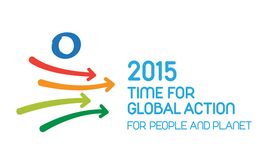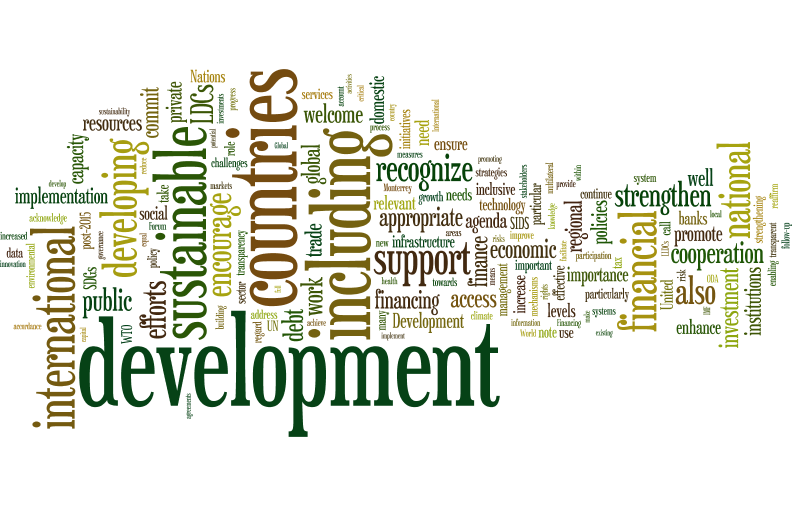 What was to be expected from Addis Ababa and how was Addis prepared and will it be finalized in New York? A two-year UN process and a high-level gathering on Financing for Development made way for Addis to deliver what it needed to deliver: the means to deliver on the global goals as the sustainable development goals have been renamed. How come development fell off the table and effectively has been reduced from 0.7% of GDP to 0.2% of GDP for Least Development Countries? Climate Climate is the big thing. Hence quite a number of paragraphs of the outcome document in Addis made reference to interventions to combat climate change or deal with the impacts thereof. But instead of turning to their citizens to accomplish this, governments are turning towards corporates in resolving the worlds problems, mistakenly replacing consumer power by governing power. Civil society was not so satisfied and SID raised a number of concerns on their website. Hence the new 'social compact' became a global compact between governments and big corporates, already in the making for a while through the global compact. Is it realistic to expect companies to take the lead in sustainability when their clients don't care? New so called blended finance initiatives (like Convergence) should help raise 100 billion for implementation of the SDGs. If governments are the accountholders of the common public goods, should they not motivate their citizens to adhere to collective norms and values that provide space for all? The reality is that governments are not demanding, because citizens are not demanding. State Hence, if states are not doing it: Why leave it to them? And if they have not been mandated by their citizens to do so, why blame them for not doing it? The real transition that is taking place has not been detected in the process leading to the Addis Ababa Action Agenda which is still a state-driven agenda, due to its focus on domestic resource mobilization through improved taxation. What to do with social movements, with citizens that no longer use their democratic rights as there is no confidence that their leaders will come up with solutions. Instead, people sort it out themselves. They make individual decisions in relation to their energy supply, social care and economic activities, with less and less regard of regulatory frameworks. Streams of migrants expose their government's disability to take care of its citizens and guarantee peace and stability. Social contract People disconnect from the current institutions and create their own mechanisms to stay informed about opportunities as they present themselves to them and take individual decisions. Rather than investing in taxation systems governments should make an effort to reconnect to their citizens and bring their solutions into the political process. This new type of governance should be characterized by facilitation rather than administration. Instead states encourage each other to grow stronger and tax their citizens in order to deliver on global goals. Addis has been about the 0.5 rather than the 0.2 out of the 0.7. It has caused a major shift in thinking. While talks about taxation may be relevant at some stage the order has been reversed. Taxation systems find their legitimacy within a secure social contract, not the other way around. Convergence New York harbors the promise of a sustainable development pathway. The two year process finally arriving at the 17 Sustainable Development Goals, now renamed Global Goals, was marked by a cumbersome process of hearings of civil society groupings. However, mostly attended by New York based international civil society agencies with an ECOSOC consultative status. Would this guarantee inclusion of local perspectives? Then, when it comes to finance, a whole different process with different actors was organized. Actors that were simultaneously dealing with the aftermath of a global economic crisis and possibly in the process of preventing another one. In this boiling atmosphere, what was to be expected? Reasonably well functioning states, all members of the OECD, have taken the initiative to support the less fortunate states to cover the gaps in public financing through improved taxation systems. A few nations are even willing to revisit some unhealthy aspects of the global tax regime that have favored their economies over others. However to what outcome? 0.5 of the 0.7 has been 'freed' from the need to spend them on 'development' and ideally will be resourced locally rather than serve as an expression of international solidarity. It can be used to become climate smart, energy aware or digitally savvy. But why should this be financed from the 0.7% of GDP that was meant for the poorest of the poor? Is 99.3% not enough to cover for that? The G77 had reasons to ask for common but differentiated responsibilities in the Addis Ababa Action Agenda which is not theirs yet. Divergent The number of goals and even bigger number of indicators still bear the signature of the previous century. A century inspired by the Enlightment, having left the era of principles, embracing the era of knowledge and unlimited possibilities. However, despite the Enlightment a recent report of the International Council of Science (ICSU) and the International Social Science Council (ISSC) concludes that only 17% of the 169 targets underpinning the goals is weak or non-essential while half of them require additional work to meet scientific standards. Will this guarantee convergence towards a sustainable pathway? Today we are facing the facts: neither resources nor possibilities are unlimited. Unsustainable pathways have been chosen and it is hard to be divergent and challenge the system. These pathways have taken their toll on this planet which made a few people extremely rich and left the majority and the planet in ruins. It is time to be divergent and make individual choices that benefit people and planet. Following the critical mass theory, enough of these individual actions will make for positive global change. Rather than leaving it to governments to spend only 0.2% of their GDP on the Least Developed Countries I can at least make sure that from my income a certain percentage is spend in Least Developed Countries. Who knows, this may evolve into the Airbnb or Uber of the official development aid and will turn into the power engine for change that the world needs so badly. Any humanitarian aid and development agency that stays true to its mission can be your partner.
0 Comments
Your comment will be posted after it is approved.
Leave a Reply. |
About meMy name is Reinier van Hoffen. U®Reading
Click here for a summary.
Also find the text of a lecture Dr. Achterhuis held at the 2012 Bilderberg conference. Archives
August 2022
|
AddressNachtegaallaan 26
Ede, the Netherlands |
Telephone+31 (0)6 1429 1569
|
info@uraide.nl
|

 RSS Feed
RSS Feed
















